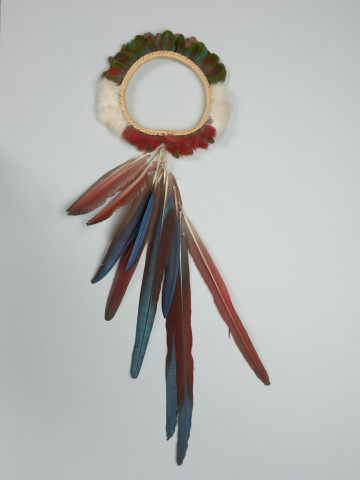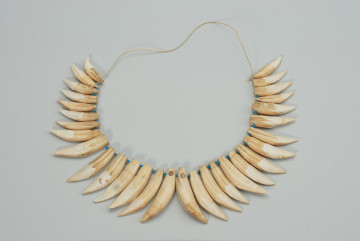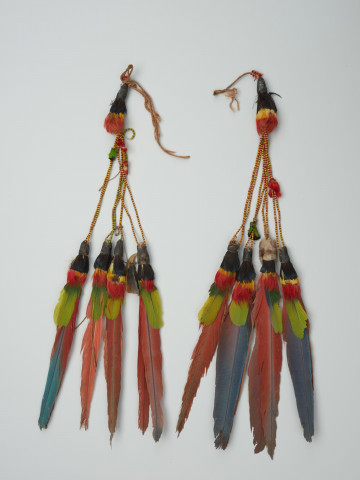
Crown of bird feathers
około 1990 — 2000
National Museum in Szczecin
Part of the collection: Crafts of the Amazon Indians
The Ye'kuana Indians speak the language of the Carib family and represent a type of tropical forest culture. Their economy is based on extensive digging, supplemented by hunting, fishing and gathering. They grow many crops, including several varieties of bananas, yams, tobacco, plantains, cotton, pineapples, sugar cane, and cassava (Manihot esculenta Cranz), which accounts for 90% of all crops. The two species of cassava, bitter (Manihot utilissima) and sweet (Manihot dulcis), are characterised by a great diversity of varieties. The Ye'kuana Indians are more inclined to plant their plots with the bitter cassava variety, despite the difficulties of preparing it for consumption. One could say that it is the basis of their food. They use it to make casave cakes, thickly roasted mañoco porridge and the alcoholic drink cachiri. Ye'kuana Indians live in permanent settlements and change them every 7-10 years due to the degradation of the cultivated soil. They traditionally live in large communal huts called ëttë, which house 20-70 people. Their social organisation is based on a kinship system. In each Ye'kuana village, a chief is elected to represent the Indians in political life. A charismatic personality must distinguish the candidate. His primary duty is to maintain the spirit of community solidarity. His political decisions are consulted with the council of elders, which is made up of one person from each family living in the settlement. Council meetings can only take place at night, and disputes are usually settled peacefully. The presented ceremonial weapon of yari'waru is made of hardwood (Ocotea cymbarum). Its shape (especially the handle) resembles a snake, which in Ye'kuan mythology symbolises considerable danger. The Ye'kuana Indians and many other groups of Amazonia Indians feel a deep aversion to these reptiles. In the past, yari'waru served men as a personal weapon used in hand-to-hand combat. Today, it is a symbol of power, which, together with a crown and epaulettes made of bird feathers, is worn by the most critical Ye'kuana personalities.
Katarzyna Findlik-Gawron
Other names
personal weapon
Author / creator
Dimensions
cały obiekt: height: 99,8 cm, width: 8,3 cm
Object type
baton
Creation time / dating
Creation / finding place
Identification number
Location / status

około 1990 — 2000
National Museum in Szczecin

około 1971
National Museum in Szczecin

około 1951 — 2000
National Museum in Szczecin
DISCOVER this TOPIC
Museum of King Jan III's Palace at Wilanów
DISCOVER this PATH
Educational path